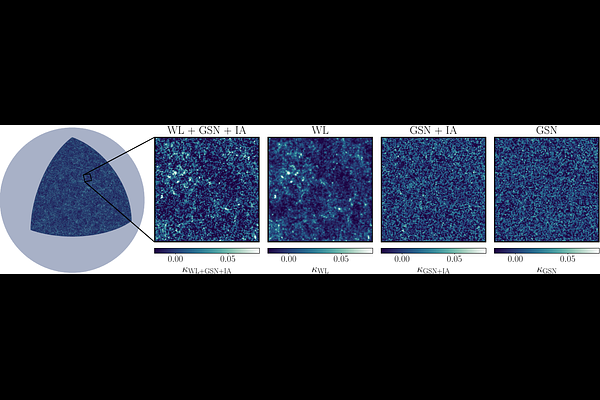Fully non-linear simulations of galaxy intrinsic alignments for weak lensing with the MillenniumTNG lightcone

Fully non-linear simulations of galaxy intrinsic alignments for weak lensing with the MillenniumTNG lightcone
Fulvio Ferlito, Volker Springel, Christopher T. Davies, Toshiki Kurita, Ana Maria Delgado, Sownak Bose, Lars Hernquist
AbstractWe present a complete forward model of a realistic weak lensing galaxy catalogue based on the 740 Mpc hydrodynamical MillenniumTNG (MTNG) simulation. Starting with a complete particle and cell lightcone covering one octant of the sky with redshift range 0 < $z$ < 1.5, we apply a group and subhalo finder to generate the corresponding galaxy catalogue for a fiducial observer. For all galaxies, we compute both their intrinsic and lensing-induced shear. The intrinsic component is derived from the luminosity-weighted inertia tensor of stellar particles, while the extrinsic (gravitational) shear is obtained through full-sky ray-tracing on the same lightcone. This allows us to directly predict the impact of intrinsic alignment (IA) of galaxies on the shear correlation function and popular convergence statistics in a fully non-linear forward model. We find that IA modifies the convergence power spectrum at all angular scales by up to 20%, it significantly impacts the PDF, altering its tails by 10-20%, and distorts peak and minimum counts up to 30%, depending on redshift and scale. We also evaluate the impact of the IA signal on the shear correlation function finding that, along with a redshift dependence, the signal strongly increases for higher galaxy stellar mass cuts applied to the catalogue. Notably, with the highest stellar mass cut we apply, the intrinsic shear autocorrelation can become comparable to the gravitational shear component on small angular scales. Our results highlight the importance of accurately modeling IA for precision weak lensing cosmology with upcoming Stage IV surveys.